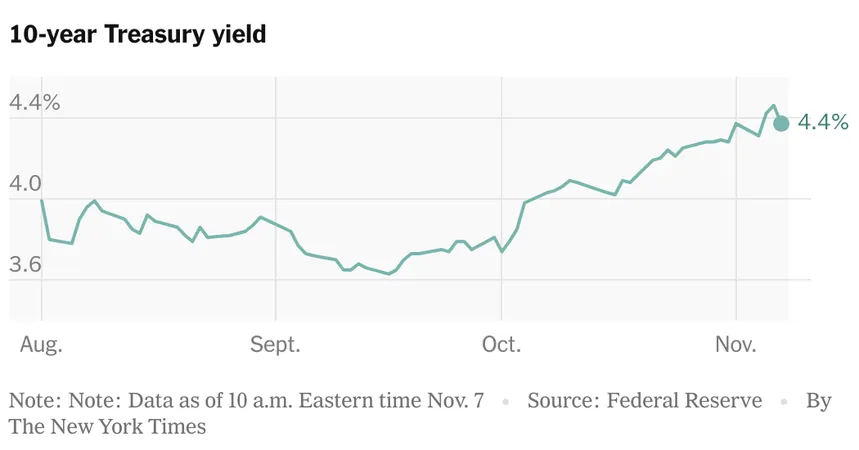
Shocking New Study Reveals Sugar's Long-Lasting Effects on Children's Health!
2024-11-04
Author: Chun
Groundbreaking New Study Highlights Childhood Sugar Intake
As the festive season approaches, children's craving for sugary treats often skyrockets. However, a groundbreaking new study highlights a critical reason for parents to reconsider their kids' sugar intake. Research published in the journal Science indicates that reducing sugar consumption during the first 1,000 days of a child's life—starting from conception and lasting until they turn two—could significantly lower their risk of serious health issues in adulthood.
Staggering Findings on Health Risks
The findings are staggering: the study found that limiting sugar during this crucial period could reduce the risk of type 2 diabetes by around 35% and the chance of developing high blood pressure by about 20%. Additionally, it delays the onset of these diseases by an average of four years for diabetes and two years for hypertension.
Unique Natural Experiment During World War II
The researchers conducted this study by analyzing a unique "natural experiment" created by the UK's sugar rationing during and after World War II. Rationing began in January 1940 and lasted until September 1953, during which citizens had limited access to sugar and other foods. The immediate aftermath saw a dramatic spike in sugar consumption—jumping from an average of 40 grams to 80 grams per day! This provided a rare opportunity to study the health impacts associated with such a significant dietary shift.
Significant Health Data Analysis
Analysis of health data from approximately 60,183 individuals in the UK Biobank, focusing on those born between October 1951 and March 1956, revealed that babies conceived or born during the rationing period faced a 30% lower risk of obesity compared to those born post-rationing. Researchers concluded that early-life sugar limitation could even influence a person’s lifelong preferences for sweet foods—approximately one-third of the risk for chronic illnesses was attributed to in utero conditions.
Expert Opinions on Sugar Consumption
Dr. Mark Corkins, a pediatric gastroenterology expert, emphasizes that humans are inherently drawn to sweet flavors from birth. While fruits once satisfied these cravings, the highly refined sugars prevalent today condition our bodies and preferences toward unhealthy options. "When sugar intake rises, our metabolism shifts, leading us to store excess energy as fat," Corkins explains, underscoring the need for immediate behavioral change.
Current Nutritional Guidelines and Family Habits
Alarmingly, nutritional guidelines recommend that individuals aged two and older limit their added sugar intake to less than 10% of their total daily calories. Yet, an overwhelming number of families exceed those guidelines, with pregnant and breastfeeding women consuming, on average, more than triple the advised amount—exceeding 80 grams daily.
Preschool-Aged Children and Nutrition
Meanwhile, many preschool-aged children fail to meet the recommended daily servings of fruits and vegetables, yet they regularly consume sugary drinks that only worsen their health outcomes.
Encouraging Healthy Eating Habits
To combat these trends, experts urge parents to model healthier eating habits to their children, as they tend to emulate their caregivers. Practical steps include replacing sugary beverages with healthier options, removing tempting junk food from home, and emphasizing a balanced diet filled with wholesome foods.
A Call to Action for Parents and Manufacturers
"It's crucial to ensure kids have the best health start in life, and reducing sugar consumption is a transformative step," says co-author Tadeja Gracner. Providing better resources and education will empower parents to combat the onslaught of unhealthy marketing aimed at children.
Shared Responsibility for Children's Health
In a world where convenience often trumps health, the responsibility lies on both parents and food manufacturers to prioritize children's health and foster a healthier environment to ensure a more promising future for the next generation.





 Brasil (PT)
Brasil (PT)
 Canada (EN)
Canada (EN)
 Chile (ES)
Chile (ES)
 España (ES)
España (ES)
 France (FR)
France (FR)
 Hong Kong (EN)
Hong Kong (EN)
 Italia (IT)
Italia (IT)
 日本 (JA)
日本 (JA)
 Magyarország (HU)
Magyarország (HU)
 Norge (NO)
Norge (NO)
 Polska (PL)
Polska (PL)
 Schweiz (DE)
Schweiz (DE)
 Singapore (EN)
Singapore (EN)
 Sverige (SV)
Sverige (SV)
 Suomi (FI)
Suomi (FI)
 Türkiye (TR)
Türkiye (TR)